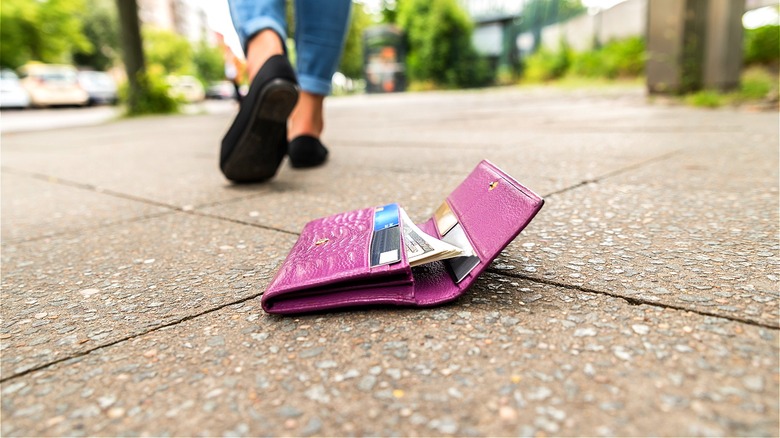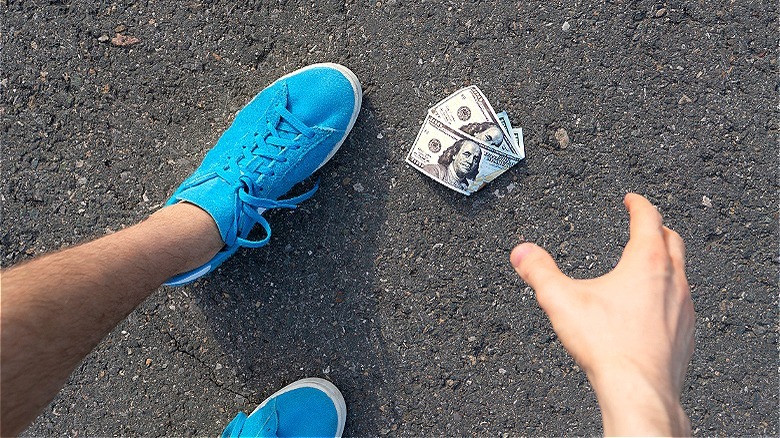What You Should Do If You Find A Lost Wallet
While finding a lost wallet sounds like a simple enough issue to solve, you might be surprised to learn it's a little more complicated than simply returning it to its owner. For starters, it's not always clear who the owner might be, and even then, getting the physical item back can be another issue altogether. Most states have laws that make it illegal to keep lost or misdelivered property, without first making a reasonable amount of effort to find the rightful owner. However, what qualifies as reasonable can be less clear. With all that in mind, the law is especially relevant to lost property in which you can easily identify the owner, like a wallet (that more than likely has a photo ID, bank cards with names on them, or even a business card).
If, on the other hand, it is not immediately clear who the owner is, the law generally dictates you should turn the wallet (or any property, for that matter) over to law enforcement, so that they can attempt to return it to its proper owner. Now, if you're the one who lost your wallet, you probably expect that someone will first pocket any cash (not to mention cards and personal information) they might find in the wallet before returning it. However, you'll be pleased to learn that a massive 2019 study across 355 different cities around the world found that people were actually more likely to attempt to return a lost wallet if it had cash in it over a wallet without cash.
Returning a wallet to its owner
Without law enforcement assistance, getting a lost wallet back to its owner can sometimes be tricky. Depending on how far away or how hard a person is to reach, some people have actually resorted to using the United States Postal Service for returning lost property. Technically, if you leave a wallet in a USPS collection box, it's considered "non-mail matter," which would then trigger the post office to send the wallet to the address listed on any visible ID inside the wallet. The wallet would be mailed but marked with insufficient postage since it wasn't properly packaged and no postage was actually paid to "mail" it in the first place. In this way, people have gamed the USPS system to get a wallet back to its owner without technically having to pay for the shipping themselves.
However, USPS doesn't encourage this tactic. In fact, a USPS spokesperson told WUSA9, "We do not encourage customers to put lost items, including wallets, in collection boxes. If someone finds a wallet the best option is to turn it in to the local police. The finder could also turn it in to a lost and found receptacle (if available) or look for an ID and contact the owner." While it might be tempting to let someone else (like USPS) handle a (found) lost-wallet situation, it's still best to try and locate the person yourself. However, law enforcement is still the next best solution should you struggle to locate or contact the owner from your own efforts.
Property with less clear ownership
While a lost wallet or item with an ID can make it easier to return, what about items without clear ownership? Whether this means a large sum of money or some other item, something known as the "first in time" rule can be an important part of common law in such scenarios. This rule generally applies to lost property found in public places, or even found on a person's property, and it gives the finder (the one who found the property) a claim of ownership over what they found. This ownership claim is second only to the original owner of the lost property. So, if the finder turns over the lost property to law enforcement or some other official and they're unable to locate the original owner within a set amount of time (the amount of time varies, depending on individual jurisdictions and local laws), the property becomes the finder's while the rights of the property's original owner are effectively severed.
As a result, this can have important implications for certain kinds of property, including money, jewelry, or other high-priced items. Keep in mind that the penalty for not attempting to find the owner of the lost property can be steep, depending on the value of the item found. In California for example, keeping any money or property over $950 without making a reasonable effort to find the property's owner can result in a felony theft charge. Amounts under $950 would be considered a misdemeanor.


